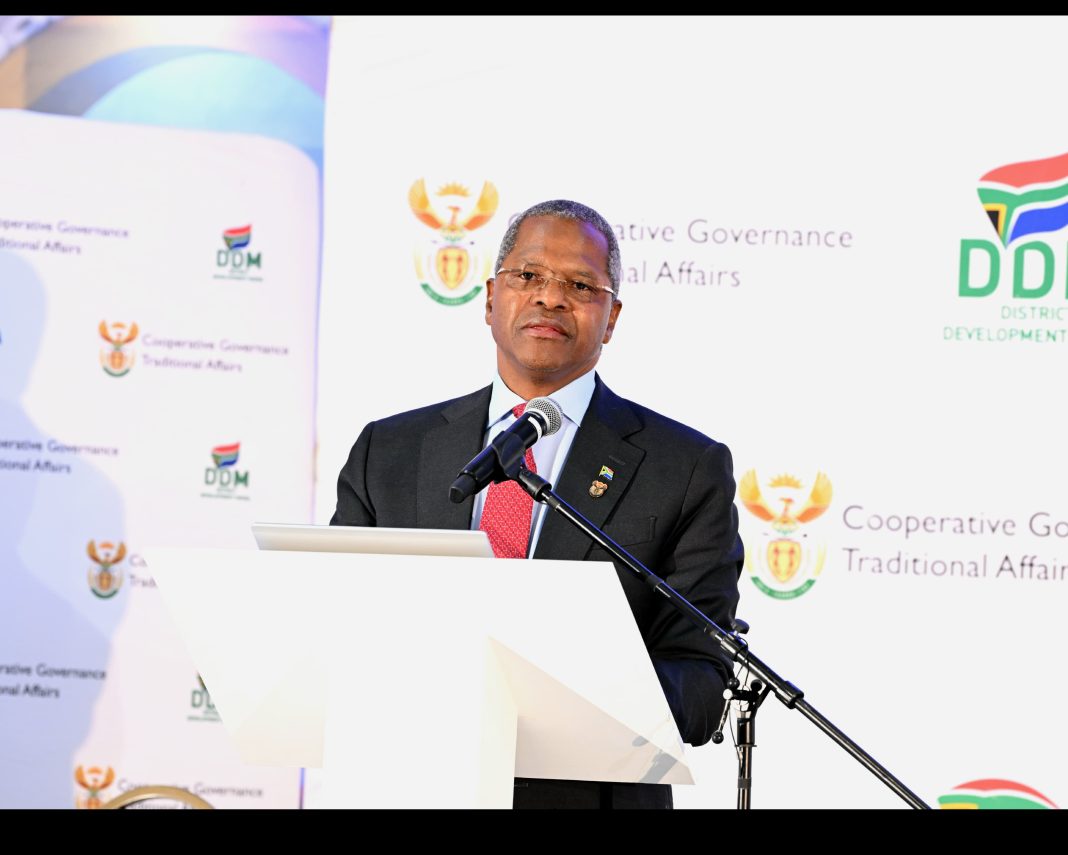By Johnathan Paoli
Cooperative Governance and Traditional Affairs (CoGTA) Minister Velenkosini Hlabisa has urgently called for bold reforms to South Africa’s local government system, warning that the 1998 White Paper on Local Government (WPLG) no longer meets contemporary needs.
Hlabisa was speaking at a high-level dialogue with political parties and key stakeholders in Midrand, held under the theme: “Every Municipality Must Work – A Call to Collective Action.”
“We believe that local government is a cornerstone of our democracy and plays a vital role in delivering services to our communities. However, we also recognise that our local government system faces challenges and that we need to work together to find solutions,” Hlabisa said.
The dialogue is part of a nationwide review of the 1998 White Paper, originally pivotal in introducing developmental local government post-apartheid.
Despite its progressive intent, Hlabisa, alongside Auditor-General Tsakani Maluleke and Deputy Minister Dickson Masemola, noted its failure to keep up with socioeconomic shifts, climate pressures, and urbanization trends over nearly three decades.
Hlabisa opened the event by reaffirming that local government is the frontline of service delivery and democratic governance.
He emphasised that the Government of National Unity (GNU) is committed to three transformative priorities over the next five years: inclusive growth and job creation; poverty reduction and cost-of-living relief; and building a capable, ethical, and developmental state.
At the center of this transformation, Hlabisa noted, is a local government system that works.
While praising the 1998 WPLG as progressive in its time, the minister said South Africa must now confront severe implementation barriers and structural weaknesses.
He identified critical shortcomings, including a flawed municipal funding model heavily reliant on national transfers; poor leadership deployment in executive councils; the exclusion of traditional leaders from decision-making; and a lack of economic viability in many municipalities, which are unable to collect revenue and thus fall into distress or bankruptcy.
“In some municipalities, we’re dealing with entities that have no real revenue base. They are distressed, bankrupt, and unable to pay salaries. We cannot continue business as usual,” Hlabisa said.
He further highlighted the need to revisit councillor remuneration, warning that low salaries incentivise neglect, with councillors prioritising other jobs over public service.
“We must review the structuring, funding, and remuneration of councillors to attract and retain capable leaders who focus on municipal priorities.”
Masemola presented the Discussion Document for the review, gazetted on 10 April and open for public comment until the end of the month.
He described the document as a bold step toward policy renewal and called on stakeholders to embrace a new model of cooperative, resilient, and professional local governance.
Key themes in the document include repositioning municipalities within a cooperative governance framework; aligning intergovernmental planning and budgeting; professionalising the local public administration; and building resilient and responsive municipalities.
Auditor-General Tsakani Maluleke cautioned against treating audits as mere checklists.
She emphasised that audit failures reflect deep governance dysfunction, which in turn leads to poor service delivery, collapsing infrastructure, and community disillusionment.
Her office’s most recent report revealed that only 41 of the country’s 257 municipalities received clean audits for the 2024–2025 financial year.
Maluleke warned that poor governance is not just a numbers game, but has real human consequences, from uncollected refuse to dangerous water systems.
“People say ‘you don’t eat clean audits’—but clean audits signal institutions that can manage money, fix infrastructure, and provide real services. The failure to achieve them is not technical. It is moral,” she said.
She also took aim at poor stakeholder engagement, especially the failure of metros to properly consult with the business sector during consultation processes.
“We tick ward committee attendance registers, but we ignore business and capital providers—how can we grow local economies that way?” she asked.
Maluleke stressed that the dysfunction in municipalities is not isolated, but reflects a breakdown across all three spheres of government.
Provincial COGTA departments, treasuries, and legislatures have been negligent in exercising their oversight roles, she said.
Reports required by law such as MEC assessments of municipal performance are either not produced or merely submitted as “tick-box exercises.”
“This is not just about local government. It’s about the entire ecosystem of accountability. If legislatures act surprised at AG reports, then the system is broken,” she warned.
Hlabisa unveiled nine strategic priorities for reforming the local government system: combating unethical behavior; depoliticising municipal governance and rebuilding trust with communities.
He prioritised promoting community-led development; improving financial management; and enhancing municipal capacity.
The last three priorities entail strengthening oversight; fostering partnerships; and promoting governance stability.
He urged political parties and all stakeholders to contribute actively to the review and future planning process, calling it “a once-in-a-generation opportunity” to reset the local government agenda.
All stakeholders have been invited to submit written comments on the discussion document by 30 June, with a revised White Paper to be published in March next year.
In closing, Hlabisa made an impassioned call to action.
“We can no longer review policies in isolation from reality. Our people are waiting, not for more plans, but for action. Every municipality must work, because if local government fails, democracy fails,” he said.
INSIDE METROS

